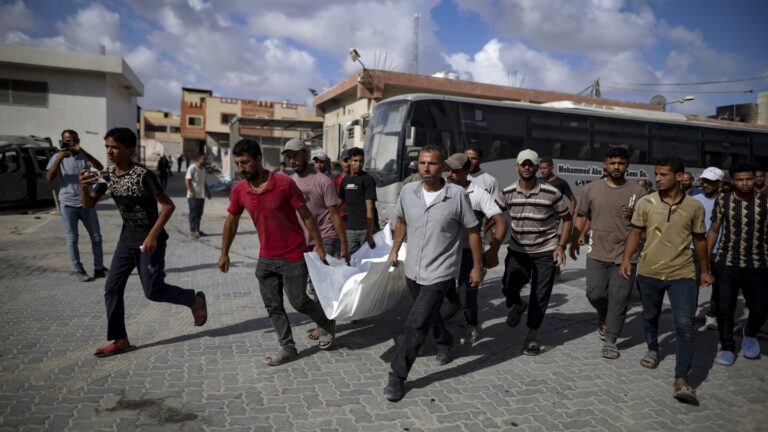DEIR AL-BALAH, Gaza (AP) — Hamas has given initial approval to a U.S.-backed proposal for a gradual cease-fire deal in Gaza, dropping a key demand that Israel commit from the outset to a complete end to the Israeli occupation. the wara Hamas official and an Egyptian official said on Saturday.
The apparent compromise by the extremist group, which controlled Gaza before launching the war with an attack on Israel on October 7, could bring the first pause in fighting since November and pave the way for new negotiations to end nine months of devastating fighting. But all sides have warned that a deal is still not guaranteed.
In Gaza, the Health Ministry said an Israeli airstrike on a school converted into a shelter killed at least 16 people and wounded at least 50 others in the Nuseirat refugee camp. Children were among the dead and wounded. The Israeli military said it was looking into the report.
The two officials, who spoke on condition of anonymity to discuss ongoing negotiations, said Washington’s phased deal would begin with a “complete and total” six-week cease-fire during which elderly, sick and female hostages would be released in exchange for hundreds of Palestinian prisoners. During those 42 days, Israeli forces would withdraw from densely populated areas of Gaza and allow displaced people to return to their homes in the northern Gaza Strip, the officials said.
During that period, Hamas, Israel and the mediators will negotiate the terms of the second phase that could see the release of the remaining male hostages, both civilians and soldiers, the officials said. In exchange, Israel would release other Palestinian prisoners and detainees. The third phase would include the return of the remaining hostages, including the bodies of the dead, and the start of a reconstruction project that would last several years.
Hamas still wants written assurances from the mediators that Israel will continue to negotiate a permanent ceasefire agreement once the first phase takes effect, the officials said.
The Hamas representative told The Associated Press that the group’s approval came after receiving “verbal commitments and assurances” from mediators that the war would not resume and that negotiations would continue until a permanent cease-fire was reached.
“We now want these guarantees on paper,” the representative said.
Months of ceasefire negotiations have stalled over Hamas’s demand that any deal include a complete end to the war. Israeli Prime Minister Benjamin Netanyahu has offered to suspend fighting but not stop it until Israel achieves its goals of destroying Hamas’ military and government capabilities and returning all hostages held by the militant group.
Hamas has expressed concern that Israel will resume the war after the hostages are released. Israeli officials have said they fear that Hamas will indefinitely extend the negotiations and the initial ceasefire without releasing all the hostages.
Netanyahu’s office did not respond to requests for comment, and Washington had no immediate comment. On Friday, the Israeli prime minister confirmed that the head of the Mossad, the U.S. intelligence agency, had made a flying visit to Qatar, a key mediator, but his office said “differences between the parties” remained.
“For the first time in months, we are full of hope,” many hostage families said. “Netanyahu, we have seen how you have repeatedly thwarted agreements in real time. Don’t you dare break our hearts again.”
Israel launched the war on Gaza after a Hamas attack in October, in which militants stormed southern Israel, killing some 1,200 people – mostly civilians – and kidnapping about 250. Israel says Hamas is still holding about 120 hostages – about a third of whom are now believed to be dead.
Since then, the Israeli air and ground offensive has killed more than 38,000 people in Gaza, according to the territory’s health ministry, which does not distinguish between fighters and civilians in its toll. The offensive has caused widespread devastation and a humanitarian crisis that has left hundreds of thousands on the brink of starvation, international officials say.
The ceasefire agreement provides for the entry of about 600 trucks of humanitarian aid into the Gaza Strip each day, half of them bound for the hard-hit north of the enclave, the two officials said. Since the Israeli attack on the city of Rafah in the far south of the country, humanitarian supplies entering the Gaza Strip have been reduced to zero.
“We want to eat, but where can we eat? The country is exhausted. The country is destitute. It is not fit for life,” said Walid Hegazi, a resident of the Jabaliya refugee camp in northern Gaza. “We feel sorry for the donkeys because we ate their wheat and barley.”
Israeli bombings of Gaza continue.
The Hamas-run Interior Ministry said four police officers were killed in an Israeli airstrike in Rafah. The ministry, which oversees civilian police, said the officers were killed while on foot patrol. It added that eight other officers were wounded. The Israeli military did not immediately respond to questions.
In Deir al-Balah, prayers were held for 12 Palestinians, including five children and two women, killed in three separate strikes in central Gaza on Friday and Saturday, hospital officials said.
___
Magdy reported from Cairo, Egypt.
___
Find more AP coverage at https://apnews.com/hub/israel-hamas-war


